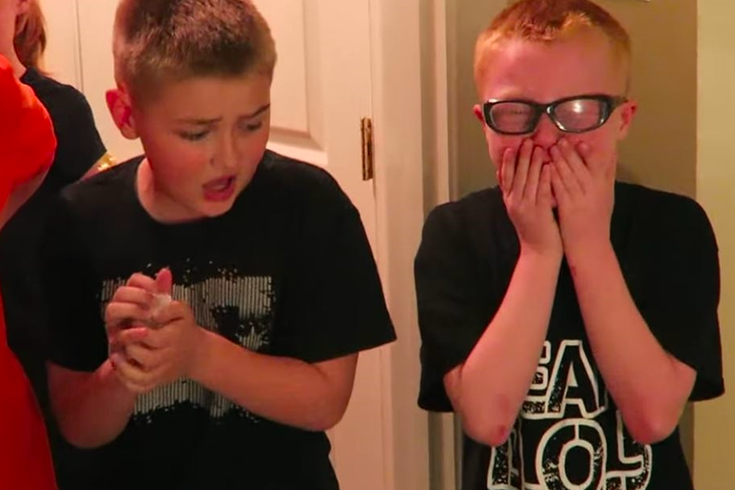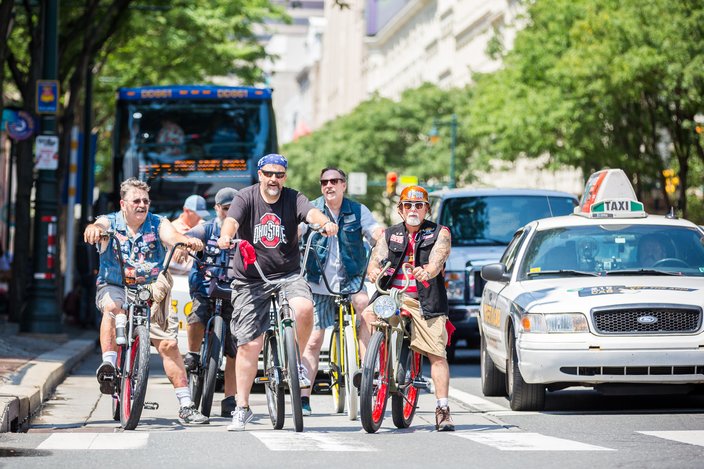
April 20, 2017
 Screengrab via YouTube/for PhillyVoice
Screengrab via YouTube/for PhillyVoice
A scene from the since-deleted 'Invisible Ink Prank' video posted on DaddyOFive's YouTube page.
Got something you want to ask? Send me your questions through Facebook, Twitter or email (with "Ask Hickey" in the subject line). Your anonymity is guaranteed — if that’s how you want it — so feel free to send them via private/direct message.
And now, this week’s questions...
Regarding the "DaddyOFive" incidents, if the State of Maryland's Child Protective Services comes out and says there is no abuse, that means all the hate he has received is legally unfounded. Will you post an article apologizing for criticizing his freedom of speech and parenting choices?
I want to be clear, I am neither defending nor supporting his actions. I'm not being a smart ass or anything. I'm only asking because YouTube was the reason he was able give his family the better life they have now, and the unproven accusations have done irreversible damage to his reputation and cost him his "job.”
Is it right to publicize your own efforts to save the kids at the cost of him losing his largest source of revenue? It's like a public, false child rape accusation; it does irreversible damage to your reputation. Who is responsible for the damages to his reputation? – Jason Vosburg via e-mail
This is a lot to unpack, Jason, so I’ll go through them one by one after bringing readers who may not know what you’re talking about up to speed.
The “DaddyOFive incidents” refers to a series of stories last week about a Maryland family that posts “prank” videos on YouTube for their hundreds and thousands of followers. (See here, here and here.)
One video in particular – “INVISIBLE INK PRANK! (EPIC FREAKOUT)” – caught the attention of many people, including myself.
This, because in pranking a nine-year-old son who they accused of spilling ink on his bedroom rug, DaddyOFive and MommyOFive pretty much scream, yell and curse the kid into tears before letting him know they did it, and the ink’s invisible.
Hoo boy, what a laugh riot that was.
YouTube has since removed it from its site because it violated its bullying and harassment policies. They did so because the harassment and bullying exhibited in the video the OFive’s later tried to claim was “fake” offended anybody with a modicum of compassion for young children.
Now, onto your questions.
No, I most assuredly will not apologize for criticizing his "freedom of speech and parenting choices." Why not? Well, for one thing, I stand by this paragraph in the first piece:
Long ago, I decided that it’s folly to judge how other people raise their children. Each family is different. There are few blanket rules. However – and fully admitting that my son has unfortunately profited by 25 cents each time he hears his daddy use a “bad word” – among the blanket rules that do apply is this: Don’t torment your children.
What that video showed was a child being tormented. If it was fake (which it in no way appeared to be), he didn't know it. I don’t abide by that, and I never will.
I'm not sure how this can be perceived as a freedom-of-speech issue, either. They're still free to post their videos, just like everybody is free to criticize them to their heart's content.
I’m not sorry now. I wouldn’t be sorry if CPS said the videos didn’t meet the legal definition of abuse, either. What a CPS decision in their favor wouldn’t come close to doing is make all the hate morally unfounded.
It was patently offensive in my mind as a parent and human. I didn’t bang the drum – in my opinion pieces – to have the children taken away from the parents (though the thought crossed my mind to get aboard that bandwagon), either.
All that said, it seems as if Daddy- and MommyOFive are sorry though:
As for whether it’s right to publicize my “own efforts to save the kids at the cost of him losing his largest source of revenue,” well, my job at its most basic level is to publicize. I write stories and opinions for public consumption, after all.
That people are profiting from something that I weigh in on has nothing to do with story-selection process. (Side note: Depending on YouTube hits to support a family of seven is pretty dicey to begin with.) If it did, the pickle industry would probably own seven of my toes by now. Do you think movie studios should sue reviewers who pan movies, too?
Likening this situation to false child-rape accusations is so utterly offensive that I’m going to pretend you didn’t type that.
Here’s what it boils down to: The OFives did what they did on video to entertain their viewers and make some money. The free market is such that if people don’t like what they did, they can rain judgment down on them and choose not to “purchase” their product.
The critics didn’t cost him his “job.” He chose to delete, privatize or demonetize the videos on his own accord. They weren’t all taken down by YouTube.
Besides, they copped to some self-reflection and the need to rethink what they film.
— Daddyofive (@MikeMartin1982) April 18, 2017
All that said, I appreciate the measured tone in your e-mails. I wish you – and the OFive family – the best. For the kids’ sake, I hope everything gets on solid footing for them.
Cars are giant metal death traps. Should we ban them? -- @AmyLeighP via Twitter
Few people are as wary, and suspicious, of cars as I am.
While I concur that they’re sometimes “giant metal death traps,” and despite having nearly lost my life after getting smacked by one way back on Black Friday 2008, I cannot abide by a movement to ban cars altogether. (Nor, it seems, can 77 percent of people who voted on Debate.org).
When operated responsibly, they are a beacon of convenience for moving folks from point A to point B all across the globe (with obvious limitations a la not being able to drive across an ocean).
Of course, everybody doesn’t operate their automobiles in a responsible fashion all the time. This is a shame. The world would be better and safer if they did.
Banning them for that reason would be like quintessentially cutting off a nose to spite society’s face. We need cars, trucks and other motorized vehicles for a litany of functions that keep civilization moving forward.
 Thom Carroll/PhillyVoice
Thom Carroll/PhillyVoiceMembers of the Jersey Devil Bicycle Club stop at 6th and Market streets near the Liberty Bell.
However, since Pope Francis’ visit to Philly, I’ve been all aboard the car-free streets push, albeit in an occasional sense. Closing off sections of the city temporarily help people get back in touch with the areas through which they zip through normally.
Heck – since a visit to Antwerp, Belgium a few years back – I’ve often looked fondly upon an idea that would close off some streets permanently. (I’m looking at you, Old City.) But even that would be done in a limited sense.
Cars are not perfect.
They kill people.
But they have to stay in existence despite their shortcomings.